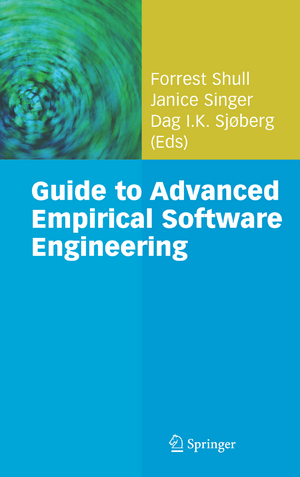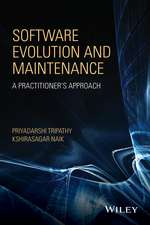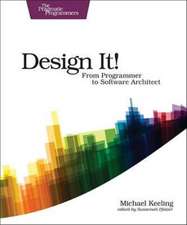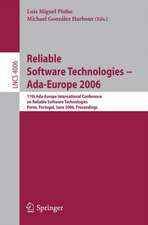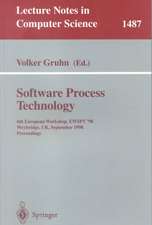Guide to Advanced Empirical Software Engineering
Editat de Forrest Shull, Janice Singer, Dag I. K. Sjøbergen Limba Engleză Hardback – 25 oct 2007
| Toate formatele și edițiile | Preț | Express |
|---|---|---|
| Paperback (1) | 1043.55 lei 6-8 săpt. | |
| SPRINGER LONDON – 13 oct 2010 | 1043.55 lei 6-8 săpt. | |
| Hardback (1) | 1049.98 lei 6-8 săpt. | |
| SPRINGER LONDON – 25 oct 2007 | 1049.98 lei 6-8 săpt. |
Preț: 1049.98 lei
Preț vechi: 1312.48 lei
-20% Nou
Puncte Express: 1575
Preț estimativ în valută:
200.94€ • 218.19$ • 168.79£
200.94€ • 218.19$ • 168.79£
Carte tipărită la comandă
Livrare economică 22 aprilie-06 mai
Preluare comenzi: 021 569.72.76
Specificații
ISBN-13: 9781848000438
ISBN-10: 184800043X
Pagini: 404
Ilustrații: XI, 388 p.
Dimensiuni: 155 x 235 x 33 mm
Greutate: 0.74 kg
Ediția:2008
Editura: SPRINGER LONDON
Colecția Springer
Locul publicării:London, United Kingdom
ISBN-10: 184800043X
Pagini: 404
Ilustrații: XI, 388 p.
Dimensiuni: 155 x 235 x 33 mm
Greutate: 0.74 kg
Ediția:2008
Editura: SPRINGER LONDON
Colecția Springer
Locul publicării:London, United Kingdom
Public țintă
ResearchCuprins
Research Methods and Techniques.- Software Engineering Data Collection for Field Studies.- Qualitative Methods.- Personal Opinion Surveys.- The Focus Group Method as an Empirical Tool in Software Engineering.- Simulation Methods.- Practical Foundations.- Statistical Methods and Measurement.- Missing Data in Software Engineering.- Reporting Experiments in Software Engineering.- A Practical Guide to Ethical Research Involving Humans.- The Management of University–Industry Collaborations Involving Empirical Studies of Software Enginee.- Knowledge Creation.- Selecting Empirical Methods for Software Engineering Research.- Building Theories in Software Engineering.- Building Theories from Multiple Evidence Sources.- Replication's Role in Software Engineering.
Recenzii
"the book does a good job of minimizing the usual problems in a collection of papers by different authors. …There are ample references in each chapter, as well as a bibliography. This is indeed a guide, as it often just points to other sources. It should be very useful to graduate students and researchers engaged in empirical software engineering research."
(Andrew R. Huber, ACM Computing Reviews, February 2009)
(Andrew R. Huber, ACM Computing Reviews, February 2009)
Textul de pe ultima copertă
Empirical studies have become an integral element of software engineering research and practice. This unique text/reference includes chapters from some of the top international empirical software engineering researchers and focuses on the practical knowledge necessary for conducting, reporting and using empirical methods in software engineering.
Part 1, ‘Research Methods and Techniques’, examines the proper use of various strategies for collecting and analysing data, and the uses for which those strategies are most appropriate. Part 2, ‘Practical Foundations’, provides a discussion of several important global issues that need to be considered from the very beginning of research planning. Finally, ‘Knowledge Creation’ offers insight on using a set of disparate studies to provide useful decision support.
Topics and features:
• Offers information across a range of techniques, methods, and qualitative and quantitative issues, providing a toolkit for the reader that is applicable across the diversity of software development contexts
• Presents reference material with concrete software engineering examples
• Provides guidance on how to design, conduct, analyse, interpret and report empirical studies, taking into account the common difficulties and challenges encountered in the field
• Arms researchers with the information necessary to avoid fundamental risks
• Tackles appropriate techniques for addressing disparate studies – ensuring the relevance of empirical software engineering, and showing its practical impact
• Describes methods that are less often used in the field, providing less conventional but still rigorous and useful ways of collecting data
• Supplies detailed information on topics (such as surveys) that often contain methodological errors
This broad-ranging, practical guide will prove an invaluable and useful reference forpractising software engineers and researchers. In addition, it will be suitable for graduate students studying empirical methods in software development.
Dr. Forrest Shull is a senior scientist at the Fraunhofer Center for Experimental Software Engineering, Maryland, and the director of its Measurement and Knowledge Management Division. In addition, he serves as associate editor in chief of IEEE Software magazine, specializing in empirical studies.
Dr. Janice Singer heads the Human Computer Interaction program at the National Research Council, Canada. She has been conducting empirical research in software engineering for the past 12 years.
Dr. Dag Sjøberg is currently research director of the software engineering group of the Simula Research Laboratory, Norway, which is ranked No. 3 in the world (out of 1400 institutions) in an evaluation in 2007 in the area of software and systems engineering.
Part 1, ‘Research Methods and Techniques’, examines the proper use of various strategies for collecting and analysing data, and the uses for which those strategies are most appropriate. Part 2, ‘Practical Foundations’, provides a discussion of several important global issues that need to be considered from the very beginning of research planning. Finally, ‘Knowledge Creation’ offers insight on using a set of disparate studies to provide useful decision support.
Topics and features:
• Offers information across a range of techniques, methods, and qualitative and quantitative issues, providing a toolkit for the reader that is applicable across the diversity of software development contexts
• Presents reference material with concrete software engineering examples
• Provides guidance on how to design, conduct, analyse, interpret and report empirical studies, taking into account the common difficulties and challenges encountered in the field
• Arms researchers with the information necessary to avoid fundamental risks
• Tackles appropriate techniques for addressing disparate studies – ensuring the relevance of empirical software engineering, and showing its practical impact
• Describes methods that are less often used in the field, providing less conventional but still rigorous and useful ways of collecting data
• Supplies detailed information on topics (such as surveys) that often contain methodological errors
This broad-ranging, practical guide will prove an invaluable and useful reference forpractising software engineers and researchers. In addition, it will be suitable for graduate students studying empirical methods in software development.
Dr. Forrest Shull is a senior scientist at the Fraunhofer Center for Experimental Software Engineering, Maryland, and the director of its Measurement and Knowledge Management Division. In addition, he serves as associate editor in chief of IEEE Software magazine, specializing in empirical studies.
Dr. Janice Singer heads the Human Computer Interaction program at the National Research Council, Canada. She has been conducting empirical research in software engineering for the past 12 years.
Dr. Dag Sjøberg is currently research director of the software engineering group of the Simula Research Laboratory, Norway, which is ranked No. 3 in the world (out of 1400 institutions) in an evaluation in 2007 in the area of software and systems engineering.
Caracteristici
To-date there has been no advanced material geared towards new researchers and graduates – this book fills this gap Offers an extensive toolkit of techniques, methods and qualitative and quantitative issues for tackling a diversity of software development contexts Offers guidance on the common difficulties and challenges encountered in the field, presenting concrete software engineering examples
